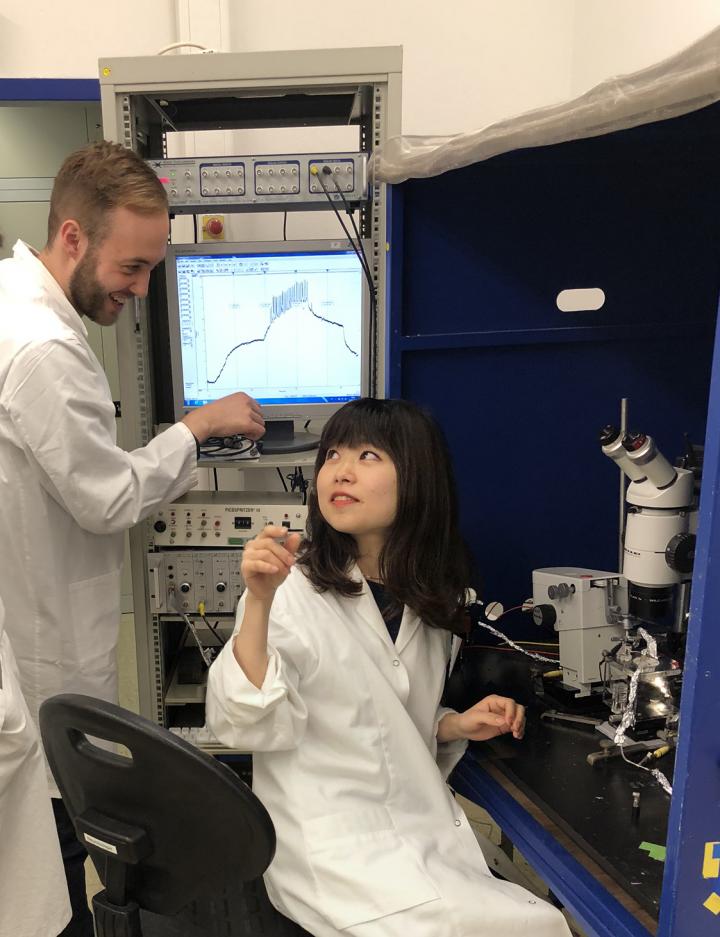Neurobiology: Publication in the Journal of the Society for Neuroscience

Credit: HHU / Institute of Neurobiology
During epileptic seizures, a large number of nerve cells in the brain fire excessively and in synchrony. This hyperactivity may lead to uncontrolled shaking of the body and involve periods of loss of consciousness. While about two thirds of patients respond to anti-epileptic medication, the remainder is refractory to medical treatment and shows drug-resistance. These patients are in urgent need for new therapeutic strategies.
Together with colleagues in Japan, Prof. Dr. Christine Rose and her doctoral student Jan Meyer from the Institute of Neurobiology at HHU have performed a study to address the cellular mechanisms that promote the development of epilepsy. While up to now, most studies and anti-epileptic drugs targeted nerve cells (neurons), this research team focused on a class of glial cells known as astrocytes.
Glial cells account for approximately half of all cells in the brain. There are different types of glial cells, which perform different functions. Astrocytes control the local environment and are responsible for the ion balance in the brain, but also play an important role in signal transmission between neurons.
In their recent paper, the researchers show that epileptic discharges lead to a rise in the pH of astrocytes, that is in their intracellular ‘alkalisation’. The change in pH disrupts the communication within the intercellular astrocyte networks. This reduced communication between astrocytes appears to exacerbate epileptic activity of neurons.
This finding points towards a potential new target for suppressing epileptogenesis at a very early stage, namely by using drugs to suppress changes in astrocytic pH accompanying neuronal activity.
The researchers were able to confirm this option by showing that animals which were given such drugs suffered less severely from epileptic hyperexcitability than untreated animals.
Prof. Rose said: “This observation is very intriguing. But it still needs to be established whether or not it can be transferred to humans. And it will take a very long time before any potential drug can be developed and be really used in the clinics.”
###
The research was carried out as a collaboration between the HHU and three universities in Japan (Keio University and Tokyo Medical and Dental University in Tokyo, Tohoku University in Sendai) as part of the “Young Glia” programme of the DFG-Priority Programme SPP 1757 “Functional Specialisations of Neuroglia” coordinated by Prof. Rose. This programme promotes collaboration between German and Japanese laboratories. In particular, it encourages and assists young scientists in realising their own bi-national research projects. For example, the HHU doctoral student Jan Meyer travelled to Japan, while Mariko Onodera from Tohoku University spent two periods working at the Institute of Neurobiology in Düsseldorf.
Original publication
Mariko Onodera, Jan Meyer, Kota Furukawa, Yuichi Hiraoka, Tomomi Aida, Kohichi Tanaka, Kenji F. Tanaka, Christine R. Rose, and Ko Matsui, Exacerbation of epilepsy by astrocyte alkalization and gap junction uncoupling, Journal of Neuroscience, 2021
DOI: 10.1523/JNEUROSCI.2365-20.2020
Media Contact
Dr. Arne Claussen
[email protected]
Original Source
https:/
Related Journal Article
http://dx.




